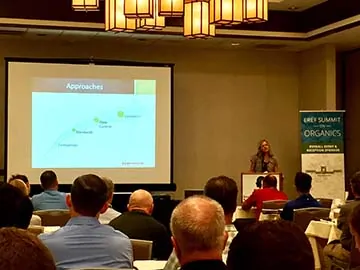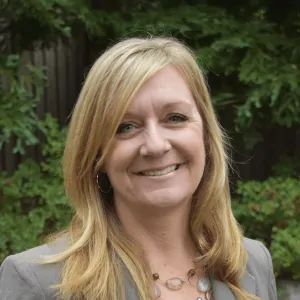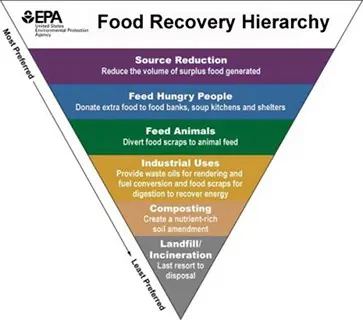

Florida SWANA will host its 2024 Winter Conference, “Together Towards Tomorrow”, February 19-21 at the new Drury Plaza Hotel Orlando in Lake Buena Vista, Florida.
Conference host is developing an interesting and educational agenda of sessions and speakers who will discuss the latest developments in the solid waste industry. This will be an excellent time to share with and learn from your peers. For industry suppliers and service providers, this is a great opportunity to showcase your company’s products and services.
This multi-day conference will include general sessions on best practices in the solid waste management profession, networking events and more.
The conference is targeted towards local, state and municipal government solid waste directors, managers, regulators, operators and coordinators; in addition to private sector consulting engineers and suppliers of materials and equipment used in the management of solid waste.
Topics may include:
Click for more conference details and registration information. Plenty of SCS Engineers professionals will be there – we hope you will too!
Learn from nationally-recognized instructors at the Compost Research & Education Foundation’s Compost Operations Training Course (COTC), September 11-15, 2023, at Booth Labs, NC State University, in Raleigh, North Carolina.
The COTC provides in-depth training from nationally-recognized instructors, and provides practical experience through hands-on activities. Content is continuously updated to reflect location conditions and up-to-date industry practices. Attendees can also tour local facilities to see theories put into practice. The Training is intended for anyone who needs comprehensive instruction on commercial-scale compost production and marketing, including compost facility managers (municipal, commercial, or farm), environmental and agricultural consultants, regulators, and equipment vendors. This week-long course provides the knowledge needed to run a composting facility successfully.
The mission of the Compost Research & Education Foundation is to advance composting technologies, practices, and beneficial uses that support resource conservation and economic and environmental sustainability. The CREF is a nonprofit 501(c)(3) organization.
Meet SCS Engineers professionals at the Iowa Society of Solid Waste Operations (ISOSWO)’s Recycling & Solid Waste Management Fall Conference, October 2-4, at the Waterloo Convention Center in Waterloo, Iowa.
The conference will feature networking opportunities, a solid waste tour and a sustainability walking tour, exhibits, and auction, and educational sessions.
Click for more details and registration information
Tracie Onstad Bills discussed how to sort through policy, program, and infrastructure to focus on the tools and concepts most useful in the thoughtful planning and preparation for organics service.

Sustainable Services Nationwide
SCS Engineers’ Tracie Onstad Bills and Leslie Lukacs were both selected to receive the California Resource Recovery Association’s (CRRA) prestigious Service Award this year. According to CRRA Executive Director, John H. Dane, the award recognizes “exceptional individual service to the organization and a contribution of time or resources beyond expectations.” That sounds like an SCSer alright.

Tracie Bills is SCS’s Sustainable Materials Management Director and is based in our Pleasanton, CA, location. She has been on the CRRA board for 10 years and has served in several leadership positions within the organization, including as its President for three years. Her expertise revolves around commercial recycling technical assistance, environmental purchasing, large venue and event zero waste programs, research and sustainability planning, garbage hauler franchise compliance and review, construction and demolition program / ordinance analysis and writing, climate inventory compilation, research and feasibility studies to help clients with comprehensive waste prevention and zero waste programs.
Leslie Lukacs serves as a Sustainable Materials Management Specialist in our Santa Rosa, CA, office. She has been on the CRRA board for 12 years and also served in a variety of leadership positions. She also founded CRRA’s Green Initiatives for Venues and Events technical council and was an instructor for CRRA’s Resource Management Certification Program for 5 years. Leslie specializes in the design and implementation of sustainable materials management and zero waste programs and is a pioneer in the greening of venues and events throughout the nation. Her extensive expertise in the logistics of zero waste, recycling, and composting programs, such as outreach management, business assistance, master planning, waste audits and characterization studies, extended producer responsibility ordinance preparation and implementation, compliance, grant writing, and administration are all key to successful long-term programs.
Both women were selected by the CRRA Board of Directors to be the 2016 recipients of the Service Award. The awards will be presented at the organization’s Annual Conference Awards Ceremony on August 9 in Sacramento.
CRRA is California’s statewide recycling association. It is the oldest and one of the largest non-profit recycling organizations in the U.S. CRRA is dedicated to achieving environmental sustainability in and beyond the state through Zero Waste strategies including product stewardship, waste prevention, reuse, recycling and composting. The organization provides its members with resources to advance local, regional and statewide waste reduction efforts which result in critical environmental and climate protection outcomes. Members represent all aspects of California’s reduce-reuse-recycle-compost economy and work for cities, counties, municipal districts, and businesses as well as hauling companies, material processors, non-profit organizations, state agencies, and allied professionals.
The Solid Waste Association of North America (SWANA) Applied Research Foundation released a report concluding that: a significant amount of additional food waste processing capacity will be required to achieve national, state, provincial, and local food waste diversion goals. The report also emphasizes the need for local decision-making in selecting and implementing those food waste diversion programs.
…a significant amount of additional food waste processing capacity will be required to achieve national, state, provincial, and local food waste diversion goals. The report also emphasizes the need for local decision-making in selecting and implementing those food waste diversion programs.
The report goes on to say that interest in recovering food waste from municipal solid waste is growing to meet goals established by the U.S. Environmental Protection Agency and U.S. Department of Agriculture, but many major metropolitan areas lack the infrastructure to manage the ability to meet the established goals. Two examples were cited:
Several states, including Massachusetts and Connecticut, condition their food waste diversion requirements on the ability of generators to access adequate capacity within a certain distance.
Speaking as SWANA’s Executive Director and CEO David Biderman stated:
We believe that Americans need to rethink how food is handled before it is considered waste, to divert it into programs to feed people, and to find other productive uses for food as food. Once it becomes waste, however, municipal decision-makers, working with their processing partners, need to determine how to best manage the material.

The SWANA report focuses on the effects of food recovery at the two lowest tiers of the hierarchy – composting and landfilling/incineration. The report concludes that food waste diverted from landfill operations has the potential to be processed at composting facilities. Then, going on to say that anaerobic digestion (AD) and co-digestion at wastewater treatment facilities are also likely destinations for diverted food waste.
Jeremy O’Brien, Director of the Applied Research Foundation, noted:
The food recovery hierarchy does not apply universally; an analysis of greenhouse gas impacts based on local data and conditions is needed to identify the best food scraps management options for a specific community.
The report encourages solid waste managers to perform a life cycle analysis of economic and environmental costs and benefits based on local needs, system capabilities, and data to identify the most effective ways to manage food waste at the local level.
SCS Engineers and SWANA are both long-time advocates for local decision-making in establishing programs to collect and manage municipal solid waste.
Related articles:
A Florida county conducts a pilot project to gauge its ability to manage yard trimmings
and biosolids using internal resources – and to confirm marketability of the finished
compost.
Read the Biocycle article by Beth Schinella and Bruce Clark
SCS Engineers will evaluate the collection, hauling, and processing of organic material and food waste for Placer County in compliance with California’s recently adopted mandatory organics recycling law. According to the California Department of Resources Recycling and Recovery, the state disposes of approximately 30 million tons of waste in landfills each year, of which more than 30 percent could be used for compost or mulch.
Composting is a viable and important technology for managing organic wastes, as are modern landfills with comprehensive landfill gas collection and utilization systems. Both of these approaches have different capabilities and limitations. Understanding the facets of each approach allows individual communities to make waste management decisions, based on facts by environmental engineers that are beneficial for both human health and the environment.
SCS recently authored a report for the Metro Waste Authority in Des Moines, Iowa regarding their yard waste compost operations. Metro Waste’s yard waste compost system includes a bag and sticker program to support separate yard waste collection, shredding, screening, and windrow composting at the Metro Compost Center, which is co-located atop a closed City of Des Moines Landfill, and at the active Metro Park East Landfill.
The SCS report evaluated the costs, greenhouse gas emissions, carbon sequestration, and the advantages and the disadvantages of continuing their current operations or alternatively considering a partial or full closing of the compost operations. If operations are reduced or stopped, these materials would be disposed of in the active municipal solid waste landfill. The active landfill has a comprehensive gas collection system, and Waste Management owns and operates an 11.2 Megawatt landfill gas-to-energy facility at the landfill.
The report was used by the Metro Waste Authority in early 2015 to support an amendment to Iowa’s solid waste regulations. The amendment allows for yard waste to be disposed of and be managed in landfills, only if the landfill has an active landfill gas collection and control system with a landfill gas-to-energy facility to effectively control and reduce methane emissions. The legislation was passed as a restricted exemption to the State’s ban on yard waste disposal in landfills. The amendment in the State’s regulations provides landfill operators some flexibility in managing these types of materials, as other states have done as well.
Most media channels fully informed their readers of the science and function of both technologies, explaining that when considering all factors, one landfill operation can reap greater environmental benefits than another operation despite using the same solution. Some organizations view the law and the report prepared by SCS as “anti” composting, or that because SCS’s investigative analysis and report proposed options, SCS does not support composting. SCS Engineers fully supports composting. In fact, we design, permit, and operate compost facilities around the nation.
Read the SCS Organics Management webpage
Read about Anaerobic Digestion here and
Economic Strategies for Solid Waste Planning here.